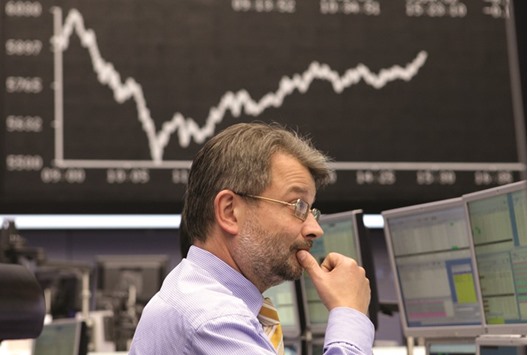The biggest monthly gain for European stocks since November is doing little to relieve investor anxiety.
In most respects the opposite is happening, as a 2.4% advance in the Stoxx Europe 600 Index through Friday has been met with falling volume, outflows from mutual funds and an evaporation in price momentum. Weighing on sentiment are votes in the UK and Spain, and the onset of a month that has historically been the worst for equities.
After starting the year with bullish calls, strategists and analysts have become increasingly sceptical about European equities, projecting flat annual returns in the Stoxx 600 and a decline in corporate profits. Following a mixed earnings season, European investors are facing a referendum on Britain’s membership in the European Union and a general election in Spain.
“No one is pretending there is a smooth road ahead,” said Ben Kumar, an investment manager at Seven Investment Management in London, who helps manage $14bn. “The first-quarter earnings we saw were not enough to say the market is strong enough to ride out any political uncertainty.”
Last week, the Stoxx 600 failed to breach its 200-day moving average, struggling to push toward a more positive longer-term trend. The measure has declined in 10 of the last 15 Junes.
Britons will vote on whether to stay or leave the EU on June 23, and Spain will hold an election three days later, following a December ballot that failed to produce a government.
After spending most of May in a tight range, the Stoxx 600 broke from its torpor and posted its biggest weekly rally since February. But as shares rose, investors continued to pull money out of the region’s funds, bringing the total withdrawals to $39bn in 16 weeks, according to a Bank of America Corp note citing EPFR Global data.
With an average of about 2.7bn shares changing hands each day in May, trading in the Stoxx 600 was the slowest since December.
Benno Galliker, a trader at Luzerner Kantonalbank AG in Lucerne, Switzerland, says last week’s gains are a proof that appetite for stocks is coming back. Polls showed Britons are leaning toward staying in the EU, while improving data boosted speculation that the global economy can withstand higher US borrowing costs.
Traders are pricing in a more than 50% probability that the Federal Reserve will increase rates by July.
“It seems Brexit risk is out of the way and a US interest rate hike is already on the cards,” Galliker said. “It feels the economy is getting stronger, and the market seems to be ready for a small US hike in June or July.
The European market is still lagging behind the US, and there’s plenty of room from here on.”
The Stoxx 600 is still down 4.3% for the year, while the S&P 500 has swung to gains. Political uncertainty aside, European stock investors also have to contend with lingering concerns including the impact of China’s slowing economy.
“The problem in Europe is that even when it’s addressing its own issues in quite a satisfactory way, global issues tend to also get caught in the sentiment,” Seven Investment Management’s Kumar said. “What do we need to get things really firing in Europe? We need everything in the global economy to be OK - a benign Fed, a rate hike dealt with well by the market, an increase in confidence in China.”

A financial trader monitors his computer screens beneath a display of the DAX Index curve at the Frankfurt Stock Exchange. After starting the year with bullish calls, strategists and analysts have become increasingly sceptical about European equities, projecting flat annual returns in the Stoxx 600 and a decline in corporate profits.
